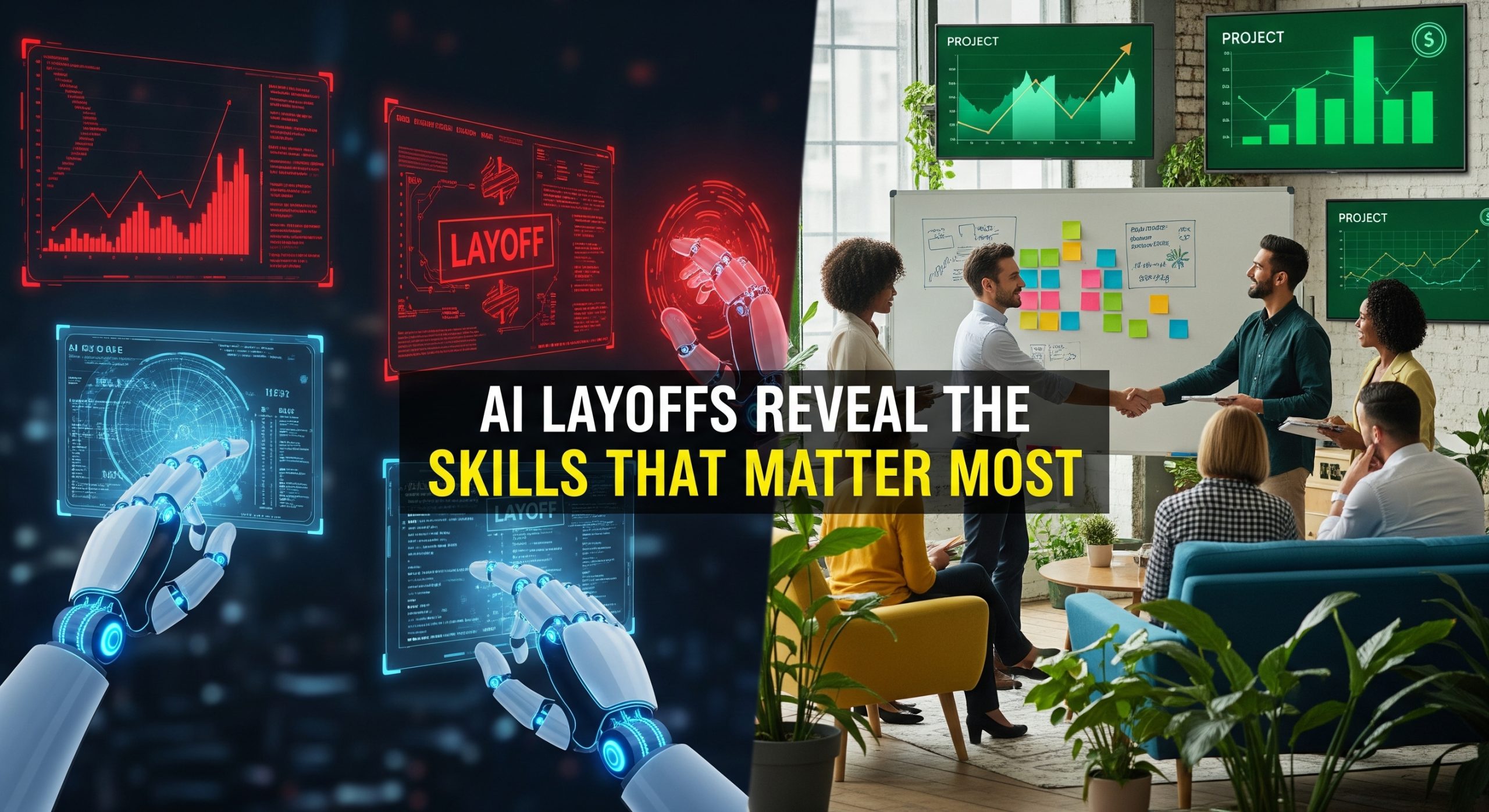These Skills Just Became Four Times More Valuable
Half a million jobs could vanish.
That’s the stark prediction for India’s IT sector as 130,981 tech workers have already lost their jobs across 434 layoff events. TCS alone cut over 12,000 positions in the largest workforce reduction in its history.
But here’s what the headlines miss. While AI eliminates routine work, it’s creating a premium market for distinctly human capabilities.
The data tells a different story than the doom narratives suggest.
The Real Pattern Behind the Layoffs
Microsoft reported $70.1 billion in revenue, up 13%, while cutting 15,000 jobs. This reveals the actual dynamic at play.
Companies aren’t struggling. They’re optimizing.
The layoffs target what industry analysts call the “big fat middle layer.” About 70% of cuts affect workers with 4-12 years of experience who have built their careers around tasks that AI now handles more efficiently.
But the same force creating this disruption is simultaneously increasing demand for skills that complement rather than compete with artificial intelligence.
The Four-Times Factor
Research shows soft skills are now 4x more important than technical skills in hiring decisions. Emotional intelligence, ethical judgment, and collaboration have become the premium capabilities.
Work tasks that depend on uniquely human capacities like empathy, judgment, ethics, and hope are associated with employment growth. Hope capability shows the largest impact on job security.
This shift explains why skills-based hiring increased to 81% in 2024. Companies discovered that 90% reported fewer hiring mistakes after adopting skills-based methods, and 94% say their skills-based hires outperform those hired through traditional qualification screening.
The future belongs to capabilities, not credentials.
What Smart Companies Are Doing Right Now
While others panic about AI displacement, forward-thinking organizations are recalibrating their talent acquisition strategies around human-AI collaboration.
They’re identifying roles where human creativity, relationship building, and complex problem-solving create competitive advantages that AI cannot replicate.
These companies understand that AI excels at replicating and recombining existing ideas. Still, it cannot generate the paradigm-breaking innovations needed to solve complex challenges like climate change or increasing income disparities.
True creativity requires human experience, emotion, and intuition.
The Recruitment Process Revolution
This transformation demands a new approach to talent acquisition. Traditional hiring methods that focus on technical qualifications miss the human capabilities that now drive business value.
Smart recruitment partners are leveraging AI to handle resume screening and interview scheduling while focusing human expertise on evaluating emotional intelligence, creative thinking, and collaborative potential.
The goal is to identify candidates who can work alongside AI systems rather than compete with them. This requires assessment methods that go beyond standard interviews to evaluate how people solve complex problems, navigate ambiguous situations, and build relationships.
The Strategic Advantage
Companies that adapt their hiring strategies now will build teams optimized for the AI economy while their competitors struggle with workforce transitions.
57% of leaders indicate attracting and retaining talent is a top priority for 2025, while 50% of business leaders plan to hire more full-time employees, with 85% expecting higher revenues.
The opportunity exists in the gap between what most companies are doing and what the data reveals about valuable skills.
Organizations that can identify, attract, and develop human capabilities that complement AI will gain sustainable competitive advantages. They’ll build resilient teams while others deal with constant workforce disruption.
The Path Forward
The layoffs reveal which skills matter most in an AI-integrated economy. Emotional intelligence, creative problem-solving, ethical reasoning, and collaborative leadership have become the premium capabilities that drive business outcomes.
Companies need recruitment strategies that can identify these human strengths while using AI to handle routine hiring tasks. This requires partnership with recruitment professionals who understand both traditional talent evaluation and modern optimization techniques.
The businesses that thrive will be those that recognize this moment as an opportunity to build strategically superior teams while talent acquisition costs remain favorable.
The question is whether your organization will adapt its hiring approach to capture this advantage or continue using methods designed for a world that no longer exists.





